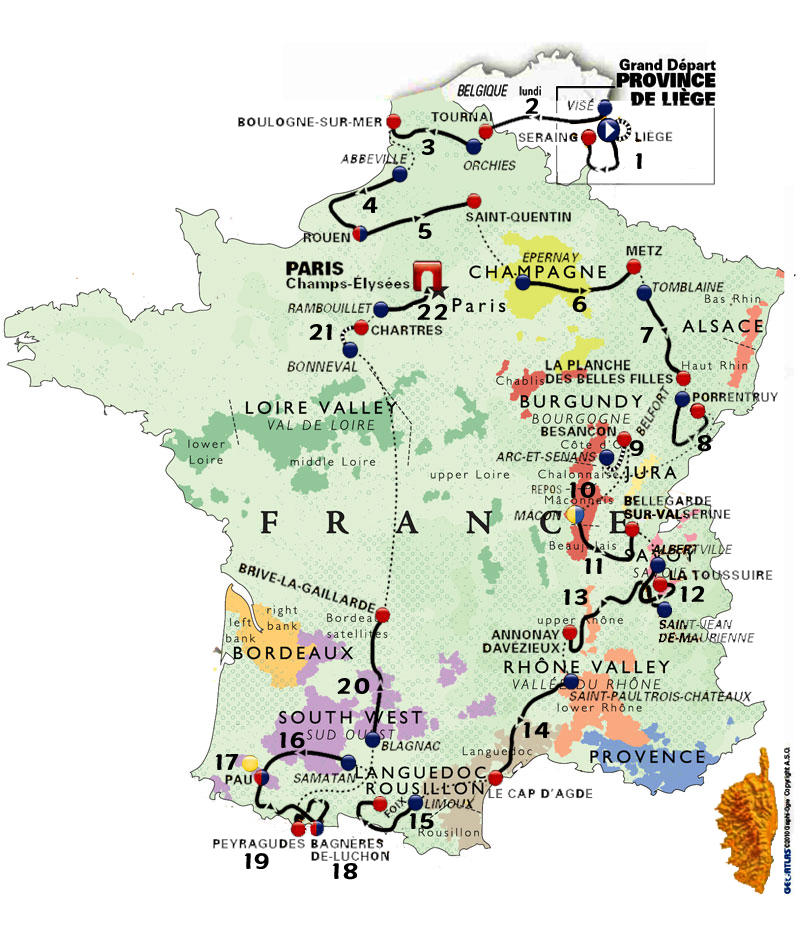
A Complete Racing Guide to Le Tour de France
There are few other sporting events during the year that reach as far across the globe as the Tour de France. For most — especially those new to the sport — it’s the only event that matters or even exists. This year’s edition looks like it won’t disappoint in providing suspense and excitement.
We’ve seen a clear favorite for the overall victory emerge, with Bradley Wiggins (Team Sky) winning one big stage race after another, but has he peaked too early? We’ve also seen the fastest man on two wheels, Mark Cavendish (Team Sky); have his most consistent season to date.
There’s no reason Cav can’t continue the trend of taking home his usual 5-6 stage wins and the Green Points Jersey in the process, but he’ll have plenty of oppositions.
Yes, there are other teams in the race other than Team Sky, but it is very much their race to lose heading into the grand depart. The beauty of the sport is knowing how unpredictable and cruel it can be and waiting to see who can emerge from it all in the end. The first week of the Tour de France is the most stressful seven days of racing, period.
The Tour can be lost at any second, and every single rider will take the start with that pressure on his shoulders. Pair that pressure with the world’s attention, and you have utter chaos. Risks will be taken and mistakes will be made. You can go ahead and throw your predictions in the trash, as there are just too many factors to consider.
Our Tour Guide is not here to tell you who is going to win, but rather, to show you how the course will come into play. The rest is left up to the teams, the conditions, and, of course, lady luck.
This guide is merely here to better your enjoyment and help you understand what’s transpiring on the roads of France – and in Belgium for the first two days. Of course, the most essential part of enjoying the sport’s biggest race is having the right beverage in hand!
France is renowned for producing some of the finest wines on Earth, and we’ll be highlighting a few of them here as we follow the riders across the country. When the race kicks off on the 30th of June, check back in to see our featured wines and gain a little inside knowledge.
Prologue – Liege – 6.4-km
 The 99th Tour de France kicks off with a 6.4-km prologue through the streets of Liege, Belgium. The course looks fairly twisty on paper, but the wide boulevards along the Meuse River will favor those that can put out some serious power.
The 99th Tour de France kicks off with a 6.4-km prologue through the streets of Liege, Belgium. The course looks fairly twisty on paper, but the wide boulevards along the Meuse River will favor those that can put out some serious power.
Bradley Wiggins (Team Sky) will want to start his bid for the Tour off with a win here. He’ll have to fight off the likes of Fabian Cancellara (RadioShack – Nissan) and the defending Tour champion, Cadel Evans (BMC).
Stage One – Liege – Seraing 198-km
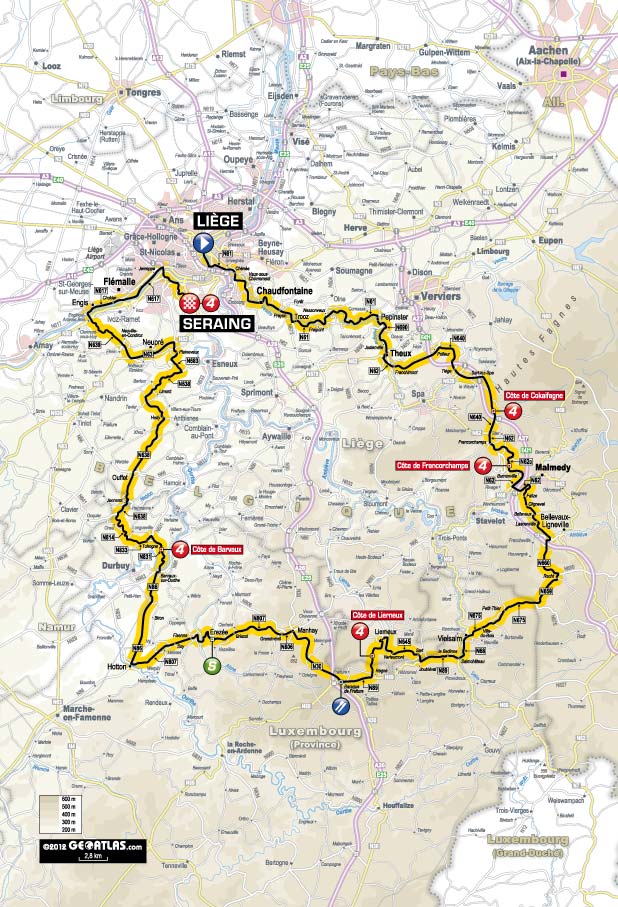 The organizers, ASO, have chosen a unique finish for the opening road stage. The usual flat stage that typically finishes with a field sprint has been replaced with a tricky uphill drag into Seraing. Tensions will already be at an all-time high, adding a finish like this will only intensify the situation.
The organizers, ASO, have chosen a unique finish for the opening road stage. The usual flat stage that typically finishes with a field sprint has been replaced with a tricky uphill drag into Seraing. Tensions will already be at an all-time high, adding a finish like this will only intensify the situation.
The climb up the Cote de Seraing is too short for the pure climbers, but it is long enough to rule out a few of the sprinters. If Alejandro Valverde (Movistar) is back to his old form, this finish is perfect for him. Don’t miss this stage as it will be a very exciting finish to watch.
Stage Two – Visé –Tournai 207.5-km
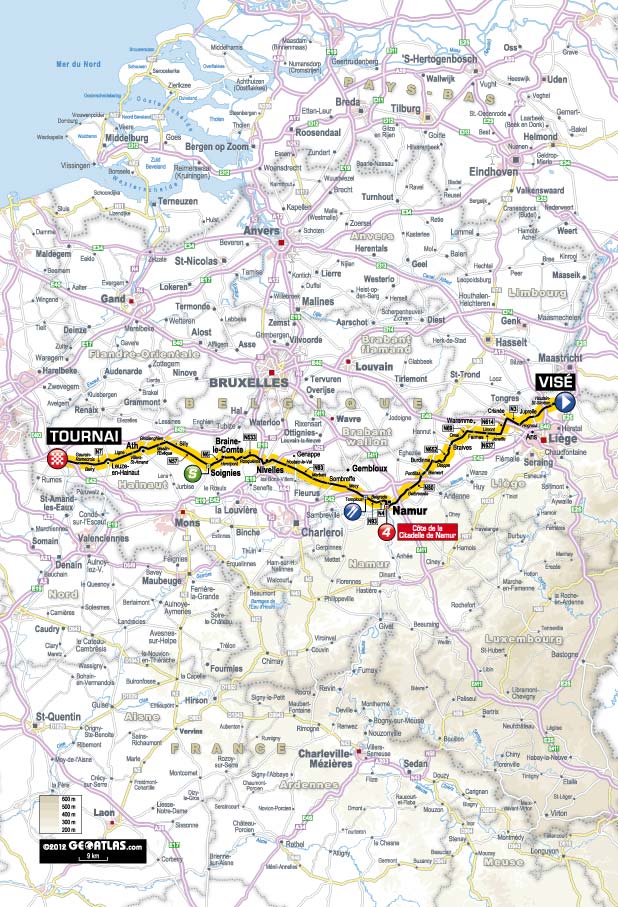 Barring any serious crosswinds, this will be one for the sprinters. The route takes the riders entirely across the country of Belgium, from the border of the Netherlands to France. One thing you can always count on in Belgium is that there is never a moment to relax.
Barring any serious crosswinds, this will be one for the sprinters. The route takes the riders entirely across the country of Belgium, from the border of the Netherlands to France. One thing you can always count on in Belgium is that there is never a moment to relax.
Aside from the unpredictable and ever-changing weather, there is endless road furniture to negotiate. A handful of teams will be looking to set up the race’s first field sprint so I wouldn’t expect to see the day end in a different outcome. The fastest man in the race, Mark Cavendish (Team Sky), will be looking to prove that once again.
Stage Three – Orchies – Boulogne-sur-Mer 197-km
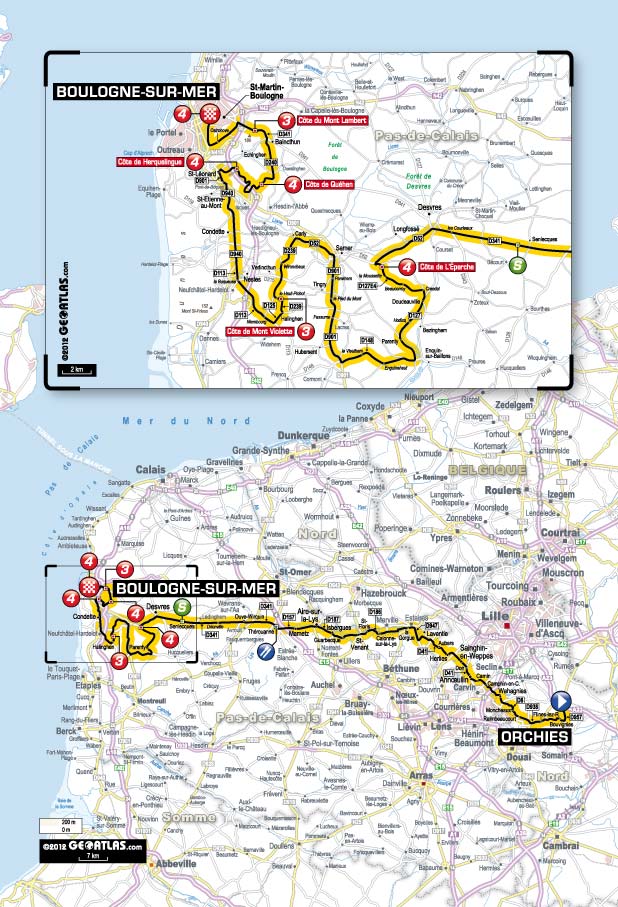 In theory, it’s another one for the sprinters, but the technical finish along the coastline could alter the result. With multiple climbs coming in the last 30-km, the race could be a tough one to control for the sprinter’s teams.
In theory, it’s another one for the sprinters, but the technical finish along the coastline could alter the result. With multiple climbs coming in the last 30-km, the race could be a tough one to control for the sprinter’s teams.
This is a great opportunity for a small breakaway to gain some time early on and surprise the sprinters at the finish. That’s easier said than done, but this a rare chance for the breakaway specialists to shine early on.
Stage Four – Abbeville – Rouen 214.5-km
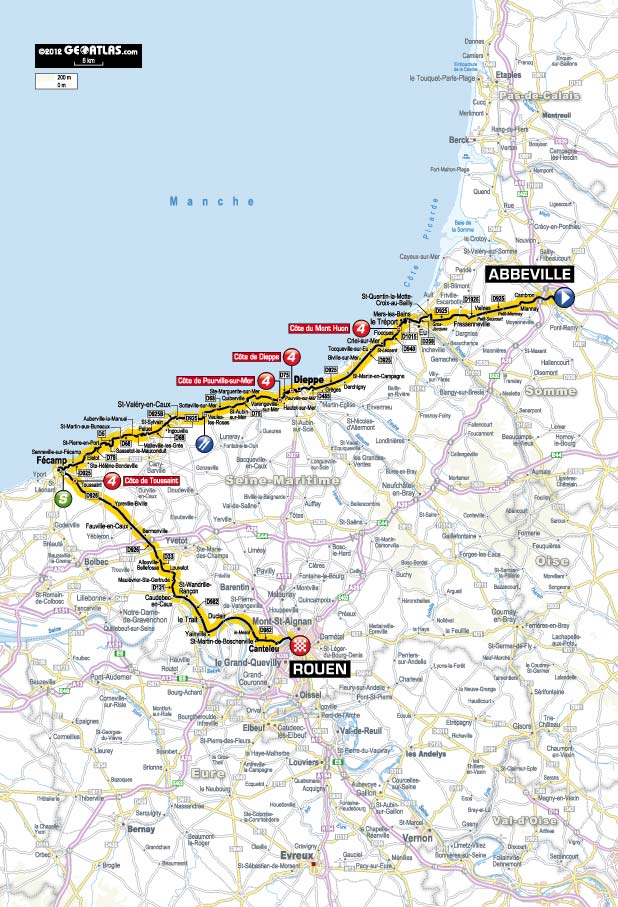 Seeing how much of the stage follows the coastline, it’s hard not to imagine some crosswinds coming into play. This will be a nervous day for all. It will be up to the strong teams, Team Sky and BMC, to pick the right moment to line out the field in the gutter and shatter the race.
Seeing how much of the stage follows the coastline, it’s hard not to imagine some crosswinds coming into play. This will be a nervous day for all. It will be up to the strong teams, Team Sky and BMC, to pick the right moment to line out the field in the gutter and shatter the race.
When you start to see echelons — riders finding the draft off to the side rather than behind — you’ll know the conditions are right to blow the race wide open. Team Sky should be the ones taking charge under those circumstances. If they do, they’ll have Mark Cavendish to easily collect the win at the finish.
Stage Five – Rouen – Saint-Quentin 196.5-km
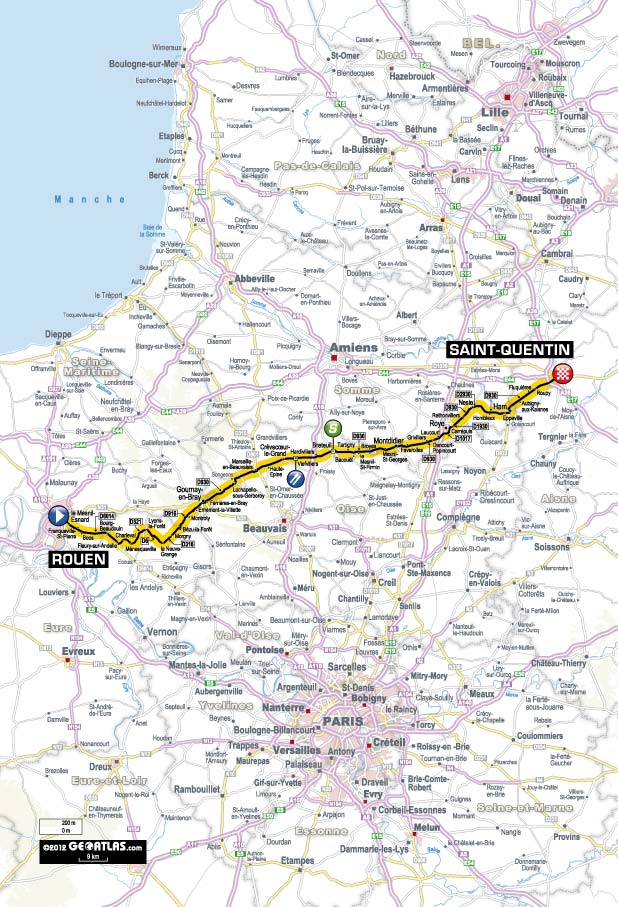 You’d be hard-pressed to find a better-suited 200-km for the sprinters in France, and everyone will know that heading into this stage. The breakaway should go easy and early as it will just be a suicide mission for those wanting to partake. Expect to see Orica GreenEdge and Team Argos-Shimano do the bulk of the work to set up Matt Goss and Marcel Kittel.
You’d be hard-pressed to find a better-suited 200-km for the sprinters in France, and everyone will know that heading into this stage. The breakaway should go easy and early as it will just be a suicide mission for those wanting to partake. Expect to see Orica GreenEdge and Team Argos-Shimano do the bulk of the work to set up Matt Goss and Marcel Kittel.
Stage Six – Épernay – Metz 207.5-km
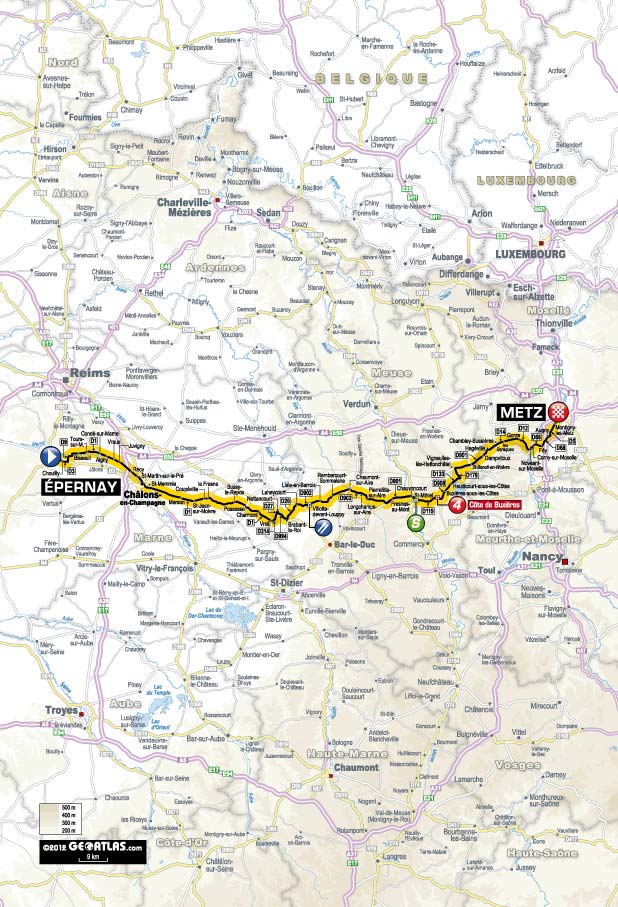 The Tour might seem to be becoming monotonous, and yes, by this point we are all looking forward to the high mountains. But there is no denying that these sprint finishes provide some of the most thrilling moments of the entire tour.
The Tour might seem to be becoming monotonous, and yes, by this point we are all looking forward to the high mountains. But there is no denying that these sprint finishes provide some of the most thrilling moments of the entire tour.
I’ve mentioned plenty of times before that the king of the sprint is Mark Cavendish (Team Sky), but the interesting thing is that his team is built around supporting their general classification hope, Bradley Wiggins. Other teams are not going to do the work if Cav keeps on winning. At some point, the breakaway will survive, and this could be the day as the race heads into the mountains tomorrow.
Stage Seven – Tomblaine – La Planche des Belles Filles 199-km
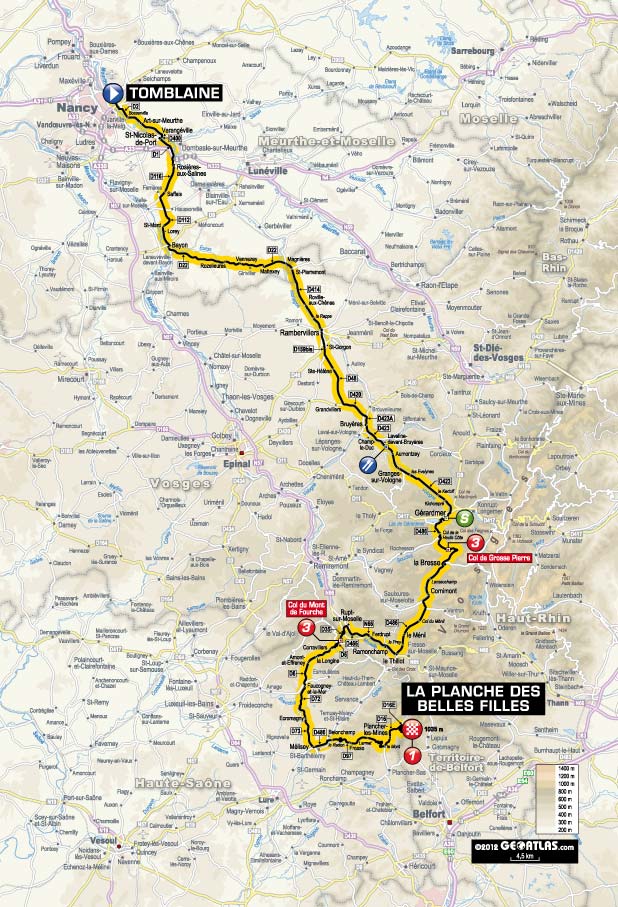 This stage marks the first true test for the favorites in the overall running. There will be no chance of a breakaway surviving, as all of the teams will want to give their leader the best shot possible at victory. A solid ride here will send a clear message of your intentions.
This stage marks the first true test for the favorites in the overall running. There will be no chance of a breakaway surviving, as all of the teams will want to give their leader the best shot possible at victory. A solid ride here will send a clear message of your intentions.
The route gets a little lumpy in the second half of the stage, but it won’t be until the finishing climb of La Planche des Belles Filles that you’ll see the real fireworks. The climb is relatively short at 6-km, but it averages 8.5% with sections up to 13%. With over a week of racing in the books, we should finally start to see which riders came to France prepared.
Stage Eight – Belfort – Porrentruy 157.5-km
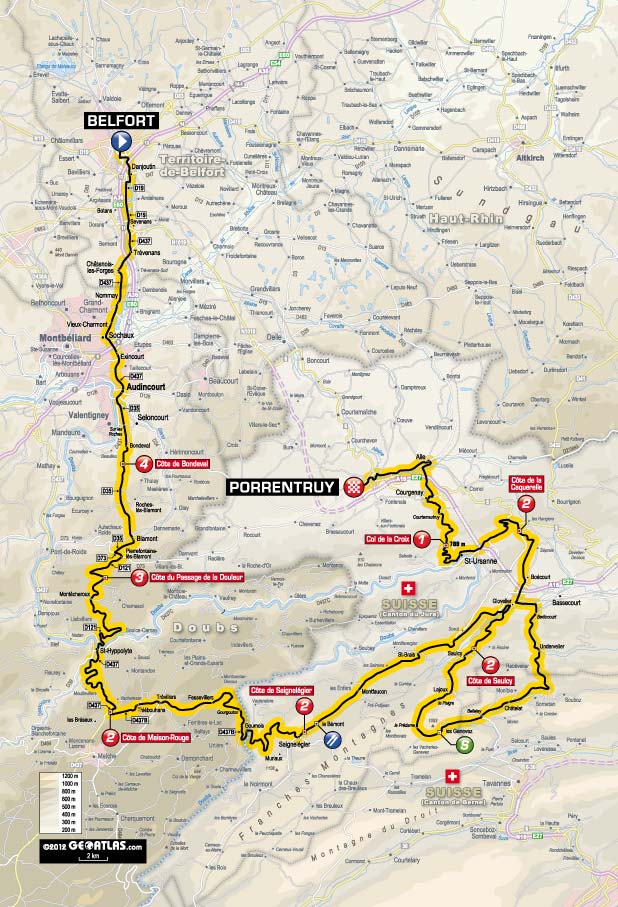 With the short distance and the lack of any flat sections of road, this will be a demanding stage for all. The Jura area is known for its “short” climbs that seem to drag on forever. With the roads undulating so much, even the descents are as difficult as the climbs.
With the short distance and the lack of any flat sections of road, this will be a demanding stage for all. The Jura area is known for its “short” climbs that seem to drag on forever. With the roads undulating so much, even the descents are as difficult as the climbs.
This day will be just hard enough to shred the peloton, but not quite hard enough to bring out the favorites. A smallish group of around thirty-fifty should be contesting the stage win up and over the final climb, the Col de la Croix.
Stage Nine – Arc-et-Senans – Besançon 41.5-km
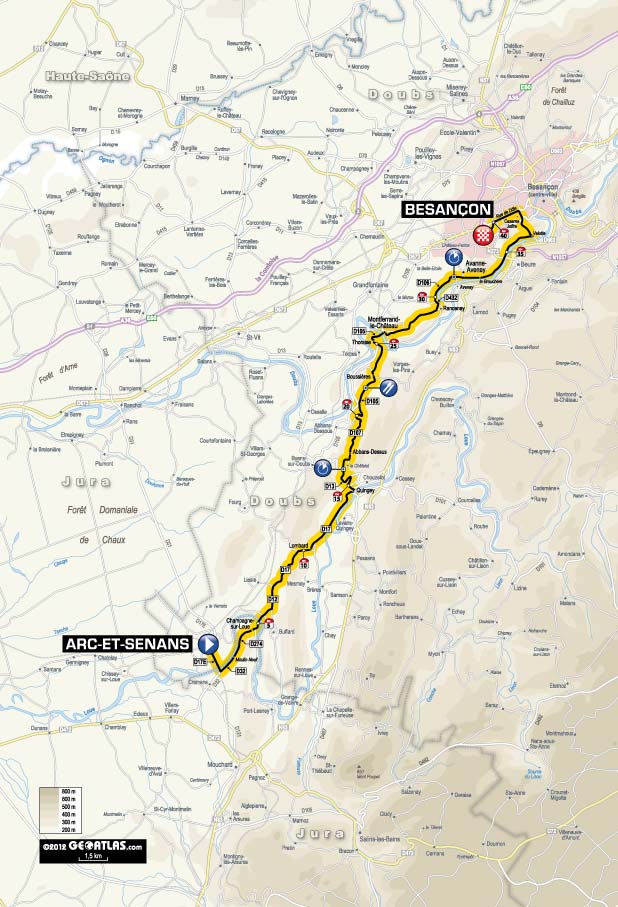 The first true time trail of the Tour de France will bring out the specialists against the clock. The GC favorites have been known to steal the show on these occasions, but the day’s glory is more likely to go to the World Time Trial Champion, Tony Martin (Omega Pharma – Quick Step).
The first true time trail of the Tour de France will bring out the specialists against the clock. The GC favorites have been known to steal the show on these occasions, but the day’s glory is more likely to go to the World Time Trial Champion, Tony Martin (Omega Pharma – Quick Step).
The stage itself offers little difficulty in terms of terrain. It will come down to who has the best equipment, power, and pain threshold.
Stage Ten – Mâcon – Bellegarde-sur-Valserine 194.5-km
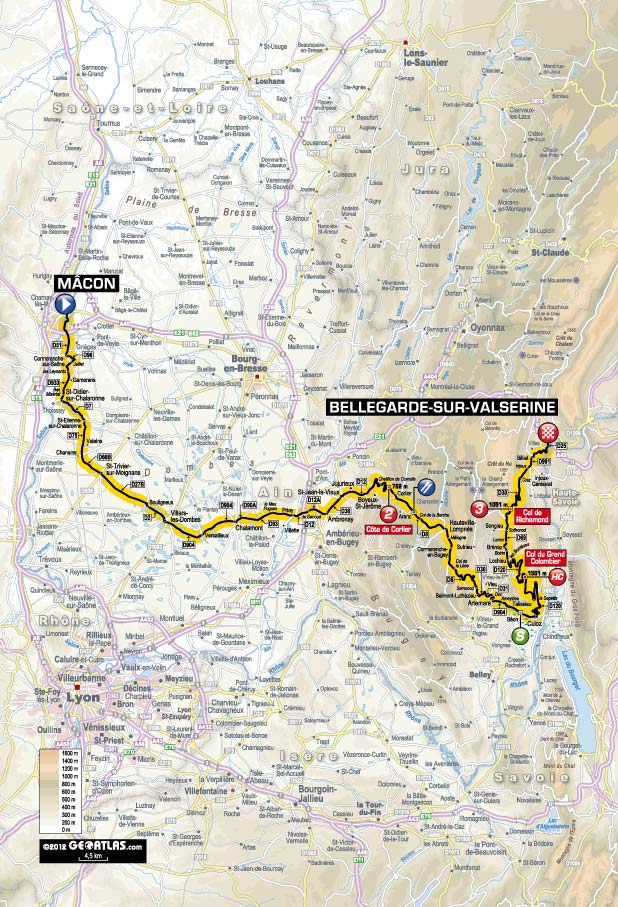 For the first time ever, the riders of the Tour de France will tackle the famous climb up the Col du Grand Colombier. The Grand Colombier has been a fixture in many well-known stage races, but for some reason, it has taken until now to make it into the Tour.
For the first time ever, the riders of the Tour de France will tackle the famous climb up the Col du Grand Colombier. The Grand Colombier has been a fixture in many well-known stage races, but for some reason, it has taken until now to make it into the Tour.
The flat start will be well suited for any and all breakaway attempts. With a downhill run into Bellegarde-sur-Valserine the heavy favorites will be happy to let a few riders that are out of contention slip up the road to win the stage. This day has breakaway written all over it.
Stage Eleven – Albertville – La Toussuire 148km
The eleventh stage of the Tour is one of the shortest, but that doesn’t make it one of the easiest. The riders will tackle four hard climbs en route to the ski area of La Toussuire. And the race will not just be taking part at the head of the peloton, as the sprinters will be calculating every second to make sure they come to the finish within the time limit as shorter stages make a smaller time cut.
The final climb up La Toussuire is not overly difficult, but the intensity of the stage beforehand could produce a smaller group than what’s normal. Cadel Evans (BMC) and Bradley Wiggins (SKY) will have to be extra attentive to each other.
Stage Twelve – Saint-Jean-de-Maurienne – Annonay Davézieux 226km

For bike riders there a stage like this is extremely annoying. With the last 140km being rolling to flat terrain, you’d think that an easy day is in store. But with two steep climbs coming within the first 80km, everyone will have to reach their limit before things settle down. It’s safe to say that a big group will get away early and the bunch won’t see them again.
The GC contenders will just have to watch and make sure that no one dangerous sneaks into that breakaway. This stage could be a good opportunity for someone ten minutes down in the overall to come back into contention.
Stage Thirteen – Saint-Paul-Trois-Châteaux – Le Cap d’Agde 217km

As the race makes its way from the Alps to the Pyrenees, the riders get a day of rest on the flat roads down to the Mediterranean. It’s been a while since we have seen the sprinters, so I’d expect for them to be ready to come out and play again.
With a sprint finish almost assured, the winner will be going to the sprinter that has made it through the Alps in the best condition. Matt Goss (Orica-GreenEdge) is one of the better climbers out of the sprinters, and he’ll be extra motivated to get his first stage win.
Stage Fourteen – Limoux – Foix 191km

The race finally reaches the foothills of the Pyrenees. Although the riders will not be venturing too far into the mountains, the ones that they’ll climb will be just as difficult. The Alps are known for their long gradual climbs, while in the Pyrenees the roads are straight, steep, and often on bad pavement.
The two steep climbs towards the finish in Foix will shake things up, but I expect to see some outsiders going on the attack. The descent off of the final climb should neutralize the GC battle.
Stage Fifteen – Samatan – Pau 158.5km

With a rest day on the horizon, and the real Pyrenees just behind it, many riders will be expecting a relaxing ride into Pau. This stage offers little difficulty and is quite short at 158.5km. The sprinter’s teams shouldn’t have any trouble controlling the break and setting up a fast finish. The sprinters will know that this is their last chance before Paris to win a stage and gather valuable points for the green jersey.
Stage Sixteen – Pau – Bagneres-de-Luchon 197km

This stage features no less than four iconic climbs – Aubisque, Tourmalet, Col d’Aspin and the Peyresourde – in route to Bagneres-de-Luchon. With the stage coming just four days from the finish in Paris, this could be the last chance for many of the riders to make their bid for yellow. This is a massive day in the heart of the Pyrenees where we should see a very aggressive race.
The fact that the finish line lies on a descent rather than the top of a mountain opens the door for a lot of riders and insures an unpredictable outcome. If Sky can continue to ride as they have they’ll have no issues keeping Brad Wiggins in yellow, but that’s not going to stop the likes of Cadel Evans (BMC) from putting all of his cards on the table.
Stage Seventeen – Bagneres-de-Luchon – Peyragudes 143.5km

This short but extremely challenging stage will be the last chance for the climbers to shine in this year’s Tour de France. It’s only been a week since we witnessed an all-out war on the roads to La Toussuire, and we should expect a similar day as the race heads to Peyragudes.
These shorter stages give hope to all riders, as they’ll feel a lot more content with four hours of pain versus the seven hours of pain they might receive in the 200km or longer mountain stages. That hope will translate into another aggressive day of racing. If Wiggins can come out of this stage with a significant lead, the Tour will be his. It’s up to the rest to try their best to break the stranglehold his team has had on the Tour this year.
Stage Eighteen – Blagnac – Brive-la-Gaillarde 222.5km

Expect to see a tired peloton as they crawl their way towards Brive-la-Gaillarde. After surviving the Pyrenees, many will already be thinking of Paris and this 222.5km stage is going to be hard to get motivated for. Those looking for breakaways will want to be extra attentive in the first hour of races as a relatively large group could easily go to the line.
If Liquigas misses the day’s breakaway and is looking for another stage they’ll be the team to take responsibility. The lumpy finish is perfectly suited for Peter Sagan.
Stage Nineteen – Bonneval – Chartres 53.5km

With the final stage into Paris being more of a parade lap for the yellow jersey, this time trail will be the last true test for the riders. Coming in at 53.5km the riders will be looking at over an hour out on the open roads alone.
The riders that excel at these tests have an amazing ability to stay focused and concentrated on every single pedal stroke. Bradley Wiggins and Chris Froome (Sky) showed us all how it’s done earlier this month and I’d expect to see a similar showing this time around. Although I’m personally hoping Tejay van Garderen (BMC) can steal the show.
FINISH – Stage Twenty – Rambouillet – Paris Champs-Élysées 120km

The traditional finish in Paris continues this year with laps on one of the world’s most famous streets, the Champs-Élysées. This stage almost always comes down to a field sprint, but we are sure to see some attacks along the way.
The slow start, complete with champagne toasts, will gradually pick up as the race enters the streets of Paris. Once on the finishing circuit, the race will be full-on. I don’t think there is a rider that knows this finish better than Mark Cavendish (Sky), and I’m sure he’d love to head into the Olympic Games with a win in Paris.
